Exploring the Impact of Neoliberalism on Social Work Practice (MSW)
VerifiedAdded on 2023/06/10
|10
|2255
|490
Essay
AI Summary
This Master of Social Work (MSW) assignment delves into the influence of neoliberalism on social work practice. It begins by identifying key contemporary neoliberal concepts such as increased trade, deregulation, free markets, and open borders. The essay then discusses and analyzes the changes to social work practice influenced by these concepts, particularly in the context of economic reforms and the shift towards free market economies. It highlights both the positive aspects, such as increased corporate social responsibility, and the negative impacts, like wealth inequality and the challenges faced by the Australian social work system. Furthermore, the assignment includes a critical reflection on the personal challenges that neoliberalist ideas may present to the developing professional practice framework, emphasizing the importance of balancing various political ideologies and advocating for a welfare state while addressing the potential pitfalls of radical liberalism. The conclusion summarizes the impact of neoliberalism on social work, highlighting the increasing concerns of social workers about the system and its effects on their practice.
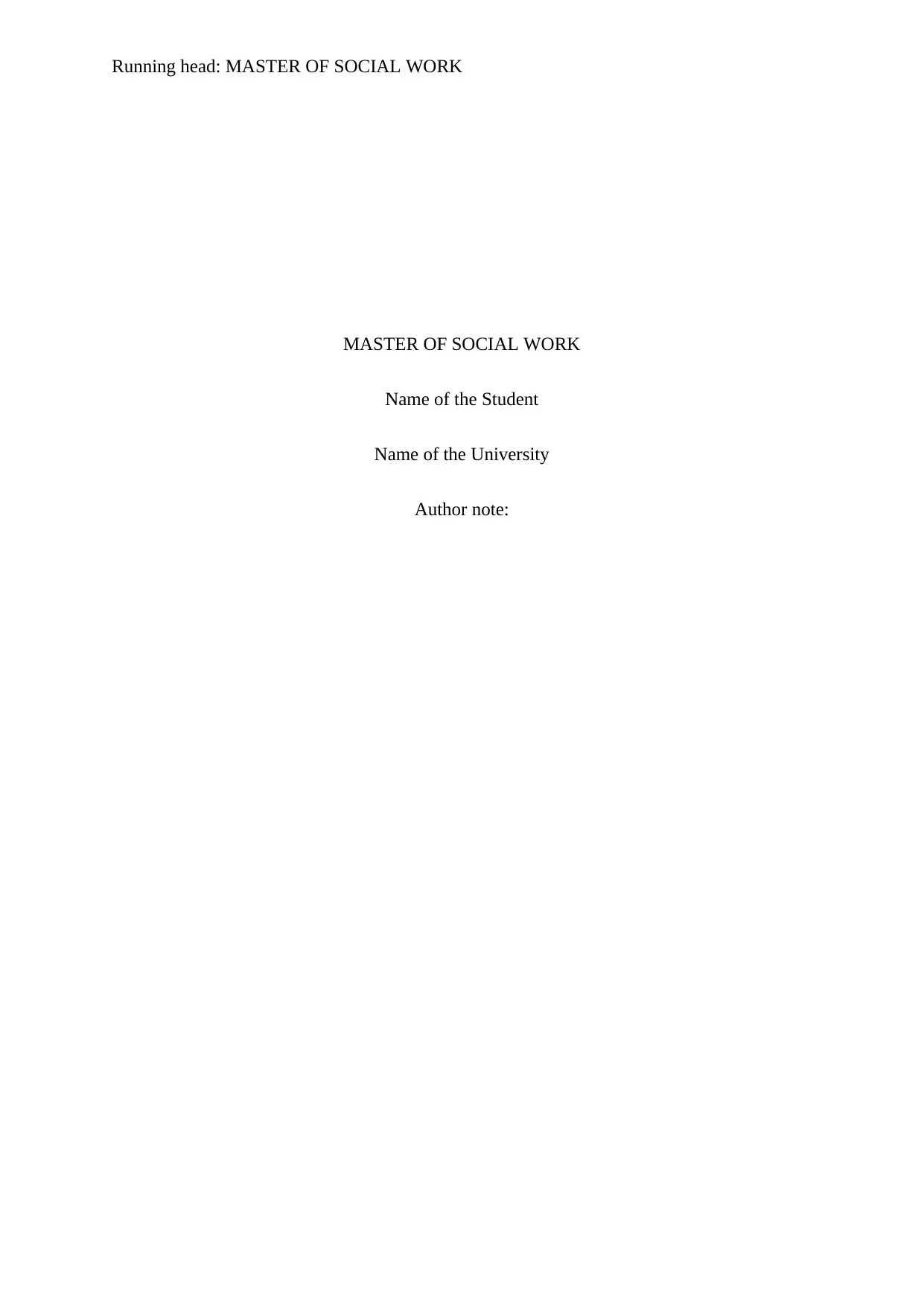
Running head: MASTER OF SOCIAL WORK
MASTER OF SOCIAL WORK
Name of the Student
Name of the University
Author note:
MASTER OF SOCIAL WORK
Name of the Student
Name of the University
Author note:
Paraphrase This Document
Need a fresh take? Get an instant paraphrase of this document with our AI Paraphraser
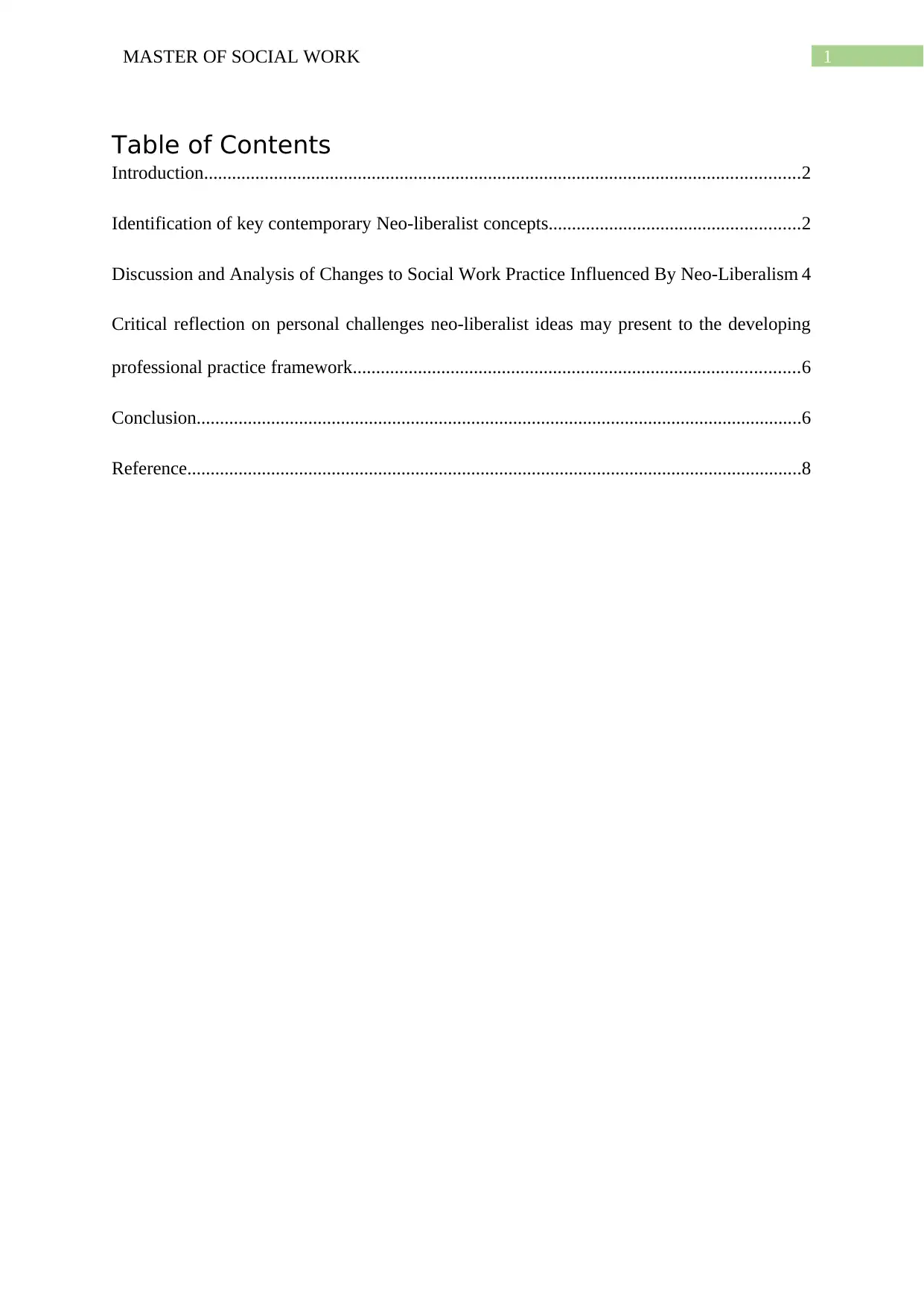
1MASTER OF SOCIAL WORK
Table of Contents
Introduction................................................................................................................................2
Identification of key contemporary Neo-liberalist concepts......................................................2
Discussion and Analysis of Changes to Social Work Practice Influenced By Neo-Liberalism 4
Critical reflection on personal challenges neo-liberalist ideas may present to the developing
professional practice framework................................................................................................6
Conclusion..................................................................................................................................6
Reference....................................................................................................................................8
Table of Contents
Introduction................................................................................................................................2
Identification of key contemporary Neo-liberalist concepts......................................................2
Discussion and Analysis of Changes to Social Work Practice Influenced By Neo-Liberalism 4
Critical reflection on personal challenges neo-liberalist ideas may present to the developing
professional practice framework................................................................................................6
Conclusion..................................................................................................................................6
Reference....................................................................................................................................8
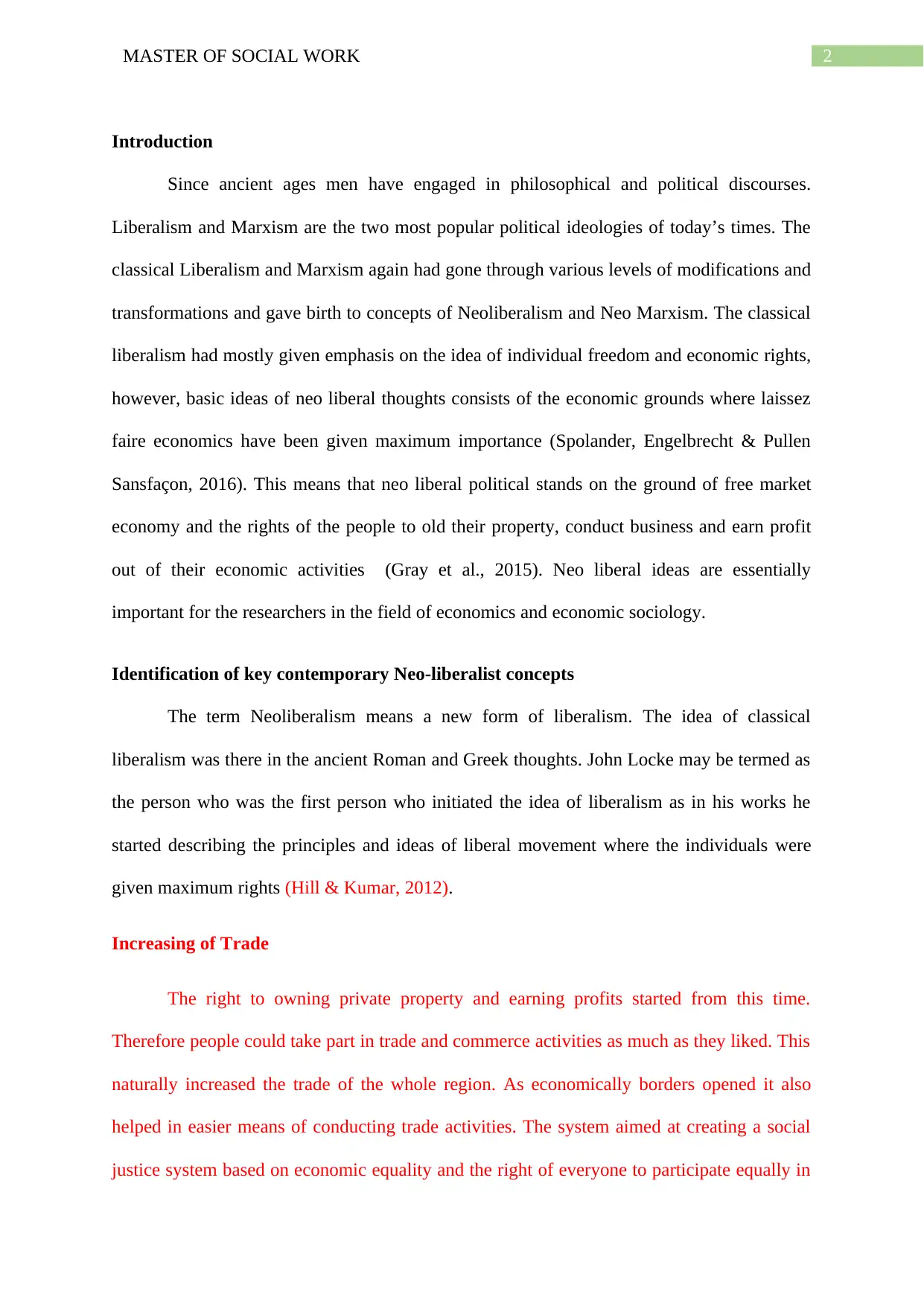
2MASTER OF SOCIAL WORK
Introduction
Since ancient ages men have engaged in philosophical and political discourses.
Liberalism and Marxism are the two most popular political ideologies of today’s times. The
classical Liberalism and Marxism again had gone through various levels of modifications and
transformations and gave birth to concepts of Neoliberalism and Neo Marxism. The classical
liberalism had mostly given emphasis on the idea of individual freedom and economic rights,
however, basic ideas of neo liberal thoughts consists of the economic grounds where laissez
faire economics have been given maximum importance (Spolander, Engelbrecht & Pullen
Sansfaçon, 2016). This means that neo liberal political stands on the ground of free market
economy and the rights of the people to old their property, conduct business and earn profit
out of their economic activities (Gray et al., 2015). Neo liberal ideas are essentially
important for the researchers in the field of economics and economic sociology.
Identification of key contemporary Neo-liberalist concepts
The term Neoliberalism means a new form of liberalism. The idea of classical
liberalism was there in the ancient Roman and Greek thoughts. John Locke may be termed as
the person who was the first person who initiated the idea of liberalism as in his works he
started describing the principles and ideas of liberal movement where the individuals were
given maximum rights (Hill & Kumar, 2012).
Increasing of Trade
The right to owning private property and earning profits started from this time.
Therefore people could take part in trade and commerce activities as much as they liked. This
naturally increased the trade of the whole region. As economically borders opened it also
helped in easier means of conducting trade activities. The system aimed at creating a social
justice system based on economic equality and the right of everyone to participate equally in
Introduction
Since ancient ages men have engaged in philosophical and political discourses.
Liberalism and Marxism are the two most popular political ideologies of today’s times. The
classical Liberalism and Marxism again had gone through various levels of modifications and
transformations and gave birth to concepts of Neoliberalism and Neo Marxism. The classical
liberalism had mostly given emphasis on the idea of individual freedom and economic rights,
however, basic ideas of neo liberal thoughts consists of the economic grounds where laissez
faire economics have been given maximum importance (Spolander, Engelbrecht & Pullen
Sansfaçon, 2016). This means that neo liberal political stands on the ground of free market
economy and the rights of the people to old their property, conduct business and earn profit
out of their economic activities (Gray et al., 2015). Neo liberal ideas are essentially
important for the researchers in the field of economics and economic sociology.
Identification of key contemporary Neo-liberalist concepts
The term Neoliberalism means a new form of liberalism. The idea of classical
liberalism was there in the ancient Roman and Greek thoughts. John Locke may be termed as
the person who was the first person who initiated the idea of liberalism as in his works he
started describing the principles and ideas of liberal movement where the individuals were
given maximum rights (Hill & Kumar, 2012).
Increasing of Trade
The right to owning private property and earning profits started from this time.
Therefore people could take part in trade and commerce activities as much as they liked. This
naturally increased the trade of the whole region. As economically borders opened it also
helped in easier means of conducting trade activities. The system aimed at creating a social
justice system based on economic equality and the right of everyone to participate equally in
⊘ This is a preview!⊘
Do you want full access?
Subscribe today to unlock all pages.

Trusted by 1+ million students worldwide
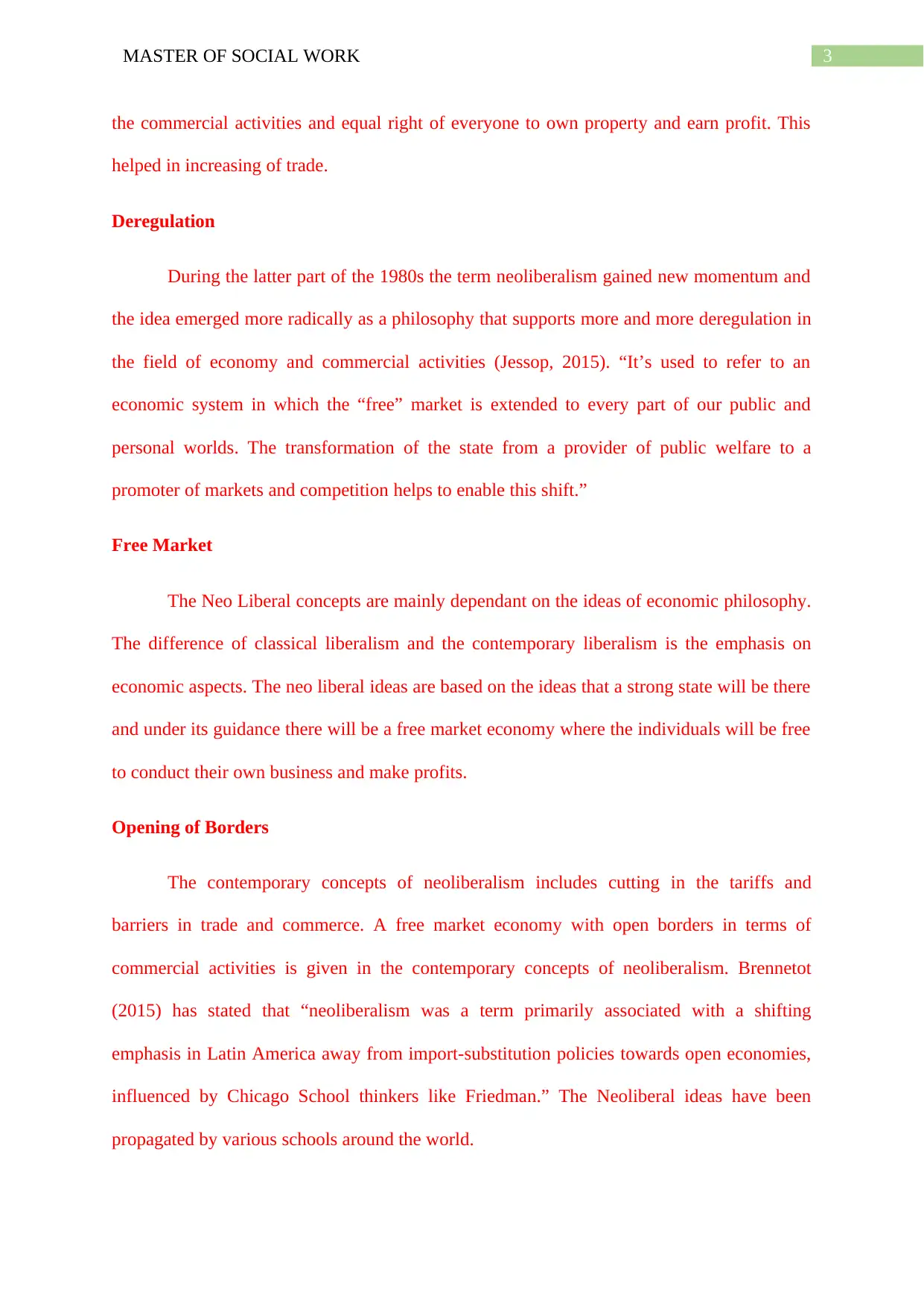
3MASTER OF SOCIAL WORK
the commercial activities and equal right of everyone to own property and earn profit. This
helped in increasing of trade.
Deregulation
During the latter part of the 1980s the term neoliberalism gained new momentum and
the idea emerged more radically as a philosophy that supports more and more deregulation in
the field of economy and commercial activities (Jessop, 2015). “It’s used to refer to an
economic system in which the “free” market is extended to every part of our public and
personal worlds. The transformation of the state from a provider of public welfare to a
promoter of markets and competition helps to enable this shift.”
Free Market
The Neo Liberal concepts are mainly dependant on the ideas of economic philosophy.
The difference of classical liberalism and the contemporary liberalism is the emphasis on
economic aspects. The neo liberal ideas are based on the ideas that a strong state will be there
and under its guidance there will be a free market economy where the individuals will be free
to conduct their own business and make profits.
Opening of Borders
The contemporary concepts of neoliberalism includes cutting in the tariffs and
barriers in trade and commerce. A free market economy with open borders in terms of
commercial activities is given in the contemporary concepts of neoliberalism. Brennetot
(2015) has stated that “neoliberalism was a term primarily associated with a shifting
emphasis in Latin America away from import-substitution policies towards open economies,
influenced by Chicago School thinkers like Friedman.” The Neoliberal ideas have been
propagated by various schools around the world.
the commercial activities and equal right of everyone to own property and earn profit. This
helped in increasing of trade.
Deregulation
During the latter part of the 1980s the term neoliberalism gained new momentum and
the idea emerged more radically as a philosophy that supports more and more deregulation in
the field of economy and commercial activities (Jessop, 2015). “It’s used to refer to an
economic system in which the “free” market is extended to every part of our public and
personal worlds. The transformation of the state from a provider of public welfare to a
promoter of markets and competition helps to enable this shift.”
Free Market
The Neo Liberal concepts are mainly dependant on the ideas of economic philosophy.
The difference of classical liberalism and the contemporary liberalism is the emphasis on
economic aspects. The neo liberal ideas are based on the ideas that a strong state will be there
and under its guidance there will be a free market economy where the individuals will be free
to conduct their own business and make profits.
Opening of Borders
The contemporary concepts of neoliberalism includes cutting in the tariffs and
barriers in trade and commerce. A free market economy with open borders in terms of
commercial activities is given in the contemporary concepts of neoliberalism. Brennetot
(2015) has stated that “neoliberalism was a term primarily associated with a shifting
emphasis in Latin America away from import-substitution policies towards open economies,
influenced by Chicago School thinkers like Friedman.” The Neoliberal ideas have been
propagated by various schools around the world.
Paraphrase This Document
Need a fresh take? Get an instant paraphrase of this document with our AI Paraphraser
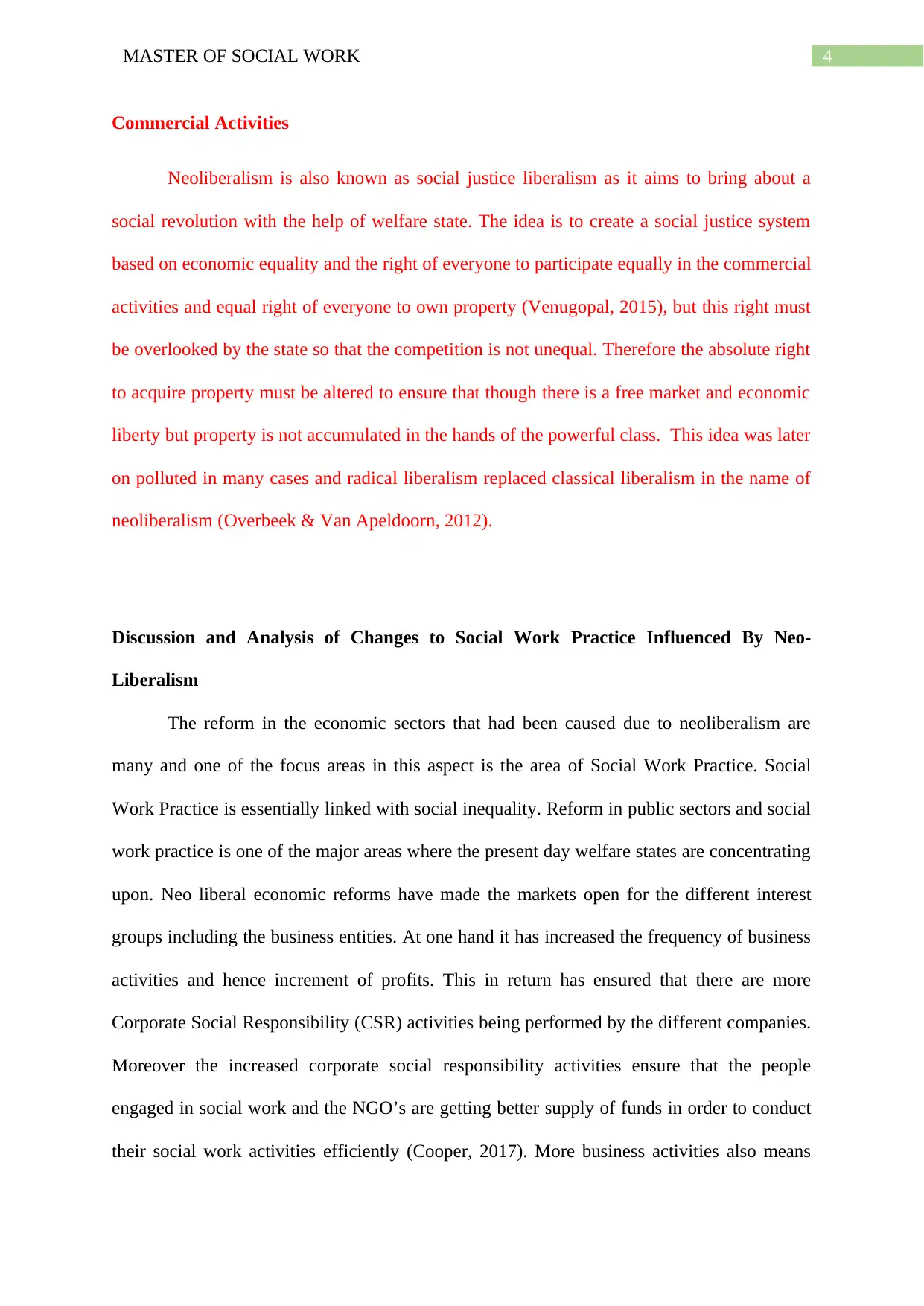
4MASTER OF SOCIAL WORK
Commercial Activities
Neoliberalism is also known as social justice liberalism as it aims to bring about a
social revolution with the help of welfare state. The idea is to create a social justice system
based on economic equality and the right of everyone to participate equally in the commercial
activities and equal right of everyone to own property (Venugopal, 2015), but this right must
be overlooked by the state so that the competition is not unequal. Therefore the absolute right
to acquire property must be altered to ensure that though there is a free market and economic
liberty but property is not accumulated in the hands of the powerful class. This idea was later
on polluted in many cases and radical liberalism replaced classical liberalism in the name of
neoliberalism (Overbeek & Van Apeldoorn, 2012).
Discussion and Analysis of Changes to Social Work Practice Influenced By Neo-
Liberalism
The reform in the economic sectors that had been caused due to neoliberalism are
many and one of the focus areas in this aspect is the area of Social Work Practice. Social
Work Practice is essentially linked with social inequality. Reform in public sectors and social
work practice is one of the major areas where the present day welfare states are concentrating
upon. Neo liberal economic reforms have made the markets open for the different interest
groups including the business entities. At one hand it has increased the frequency of business
activities and hence increment of profits. This in return has ensured that there are more
Corporate Social Responsibility (CSR) activities being performed by the different companies.
Moreover the increased corporate social responsibility activities ensure that the people
engaged in social work and the NGO’s are getting better supply of funds in order to conduct
their social work activities efficiently (Cooper, 2017). More business activities also means
Commercial Activities
Neoliberalism is also known as social justice liberalism as it aims to bring about a
social revolution with the help of welfare state. The idea is to create a social justice system
based on economic equality and the right of everyone to participate equally in the commercial
activities and equal right of everyone to own property (Venugopal, 2015), but this right must
be overlooked by the state so that the competition is not unequal. Therefore the absolute right
to acquire property must be altered to ensure that though there is a free market and economic
liberty but property is not accumulated in the hands of the powerful class. This idea was later
on polluted in many cases and radical liberalism replaced classical liberalism in the name of
neoliberalism (Overbeek & Van Apeldoorn, 2012).
Discussion and Analysis of Changes to Social Work Practice Influenced By Neo-
Liberalism
The reform in the economic sectors that had been caused due to neoliberalism are
many and one of the focus areas in this aspect is the area of Social Work Practice. Social
Work Practice is essentially linked with social inequality. Reform in public sectors and social
work practice is one of the major areas where the present day welfare states are concentrating
upon. Neo liberal economic reforms have made the markets open for the different interest
groups including the business entities. At one hand it has increased the frequency of business
activities and hence increment of profits. This in return has ensured that there are more
Corporate Social Responsibility (CSR) activities being performed by the different companies.
Moreover the increased corporate social responsibility activities ensure that the people
engaged in social work and the NGO’s are getting better supply of funds in order to conduct
their social work activities efficiently (Cooper, 2017). More business activities also means
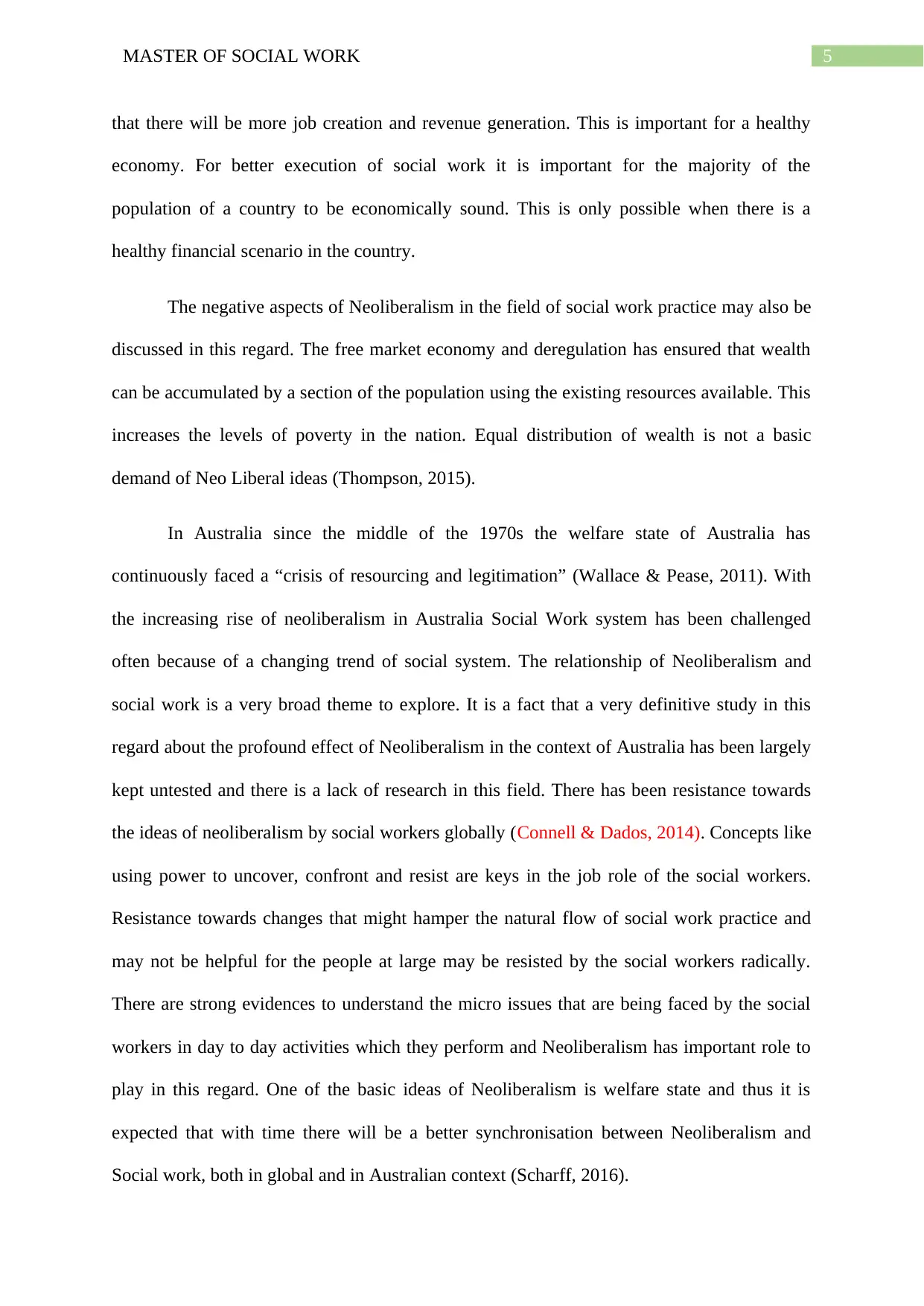
5MASTER OF SOCIAL WORK
that there will be more job creation and revenue generation. This is important for a healthy
economy. For better execution of social work it is important for the majority of the
population of a country to be economically sound. This is only possible when there is a
healthy financial scenario in the country.
The negative aspects of Neoliberalism in the field of social work practice may also be
discussed in this regard. The free market economy and deregulation has ensured that wealth
can be accumulated by a section of the population using the existing resources available. This
increases the levels of poverty in the nation. Equal distribution of wealth is not a basic
demand of Neo Liberal ideas (Thompson, 2015).
In Australia since the middle of the 1970s the welfare state of Australia has
continuously faced a “crisis of resourcing and legitimation” (Wallace & Pease, 2011). With
the increasing rise of neoliberalism in Australia Social Work system has been challenged
often because of a changing trend of social system. The relationship of Neoliberalism and
social work is a very broad theme to explore. It is a fact that a very definitive study in this
regard about the profound effect of Neoliberalism in the context of Australia has been largely
kept untested and there is a lack of research in this field. There has been resistance towards
the ideas of neoliberalism by social workers globally (Connell & Dados, 2014). Concepts like
using power to uncover, confront and resist are keys in the job role of the social workers.
Resistance towards changes that might hamper the natural flow of social work practice and
may not be helpful for the people at large may be resisted by the social workers radically.
There are strong evidences to understand the micro issues that are being faced by the social
workers in day to day activities which they perform and Neoliberalism has important role to
play in this regard. One of the basic ideas of Neoliberalism is welfare state and thus it is
expected that with time there will be a better synchronisation between Neoliberalism and
Social work, both in global and in Australian context (Scharff, 2016).
that there will be more job creation and revenue generation. This is important for a healthy
economy. For better execution of social work it is important for the majority of the
population of a country to be economically sound. This is only possible when there is a
healthy financial scenario in the country.
The negative aspects of Neoliberalism in the field of social work practice may also be
discussed in this regard. The free market economy and deregulation has ensured that wealth
can be accumulated by a section of the population using the existing resources available. This
increases the levels of poverty in the nation. Equal distribution of wealth is not a basic
demand of Neo Liberal ideas (Thompson, 2015).
In Australia since the middle of the 1970s the welfare state of Australia has
continuously faced a “crisis of resourcing and legitimation” (Wallace & Pease, 2011). With
the increasing rise of neoliberalism in Australia Social Work system has been challenged
often because of a changing trend of social system. The relationship of Neoliberalism and
social work is a very broad theme to explore. It is a fact that a very definitive study in this
regard about the profound effect of Neoliberalism in the context of Australia has been largely
kept untested and there is a lack of research in this field. There has been resistance towards
the ideas of neoliberalism by social workers globally (Connell & Dados, 2014). Concepts like
using power to uncover, confront and resist are keys in the job role of the social workers.
Resistance towards changes that might hamper the natural flow of social work practice and
may not be helpful for the people at large may be resisted by the social workers radically.
There are strong evidences to understand the micro issues that are being faced by the social
workers in day to day activities which they perform and Neoliberalism has important role to
play in this regard. One of the basic ideas of Neoliberalism is welfare state and thus it is
expected that with time there will be a better synchronisation between Neoliberalism and
Social work, both in global and in Australian context (Scharff, 2016).
⊘ This is a preview!⊘
Do you want full access?
Subscribe today to unlock all pages.

Trusted by 1+ million students worldwide
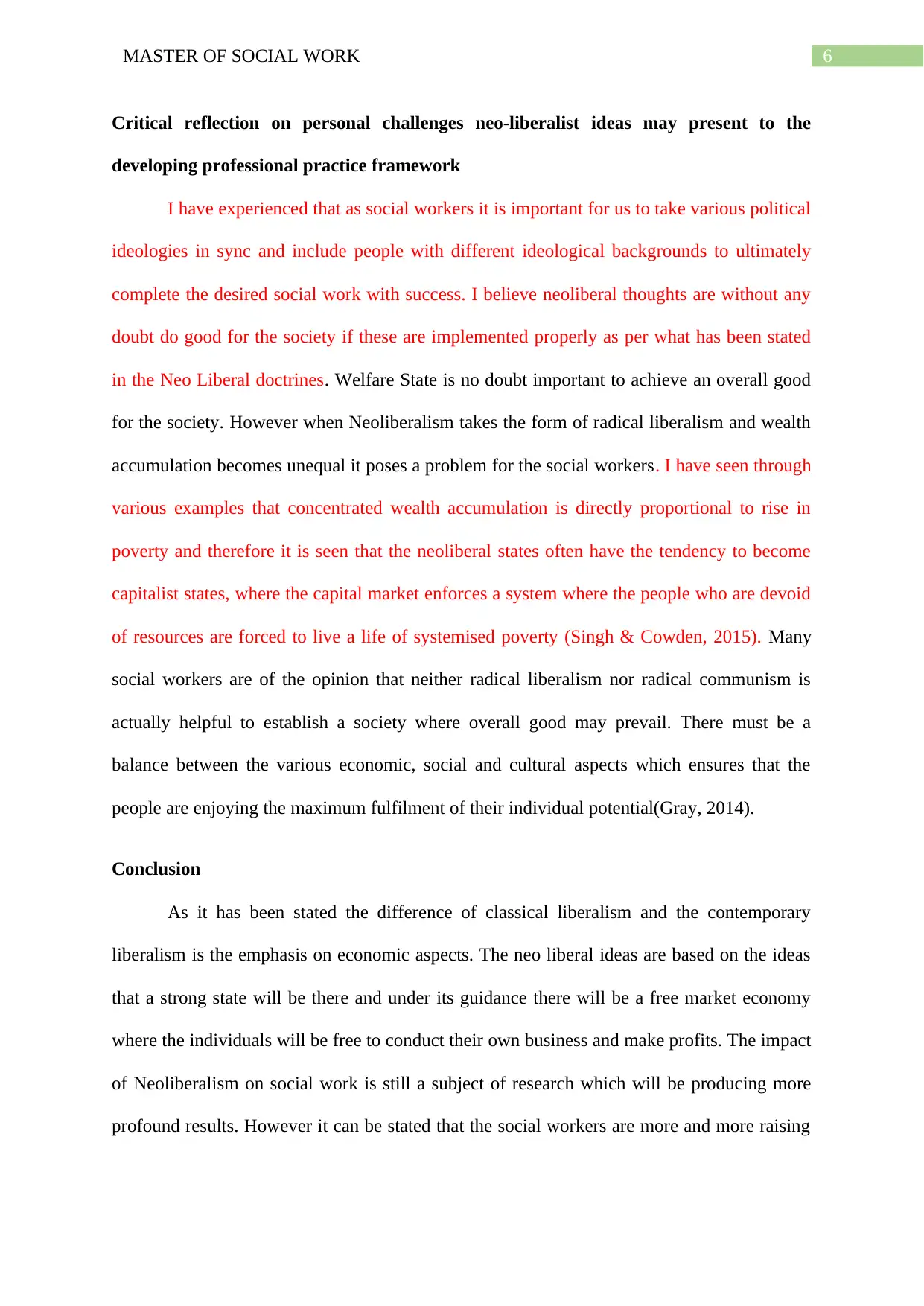
6MASTER OF SOCIAL WORK
Critical reflection on personal challenges neo-liberalist ideas may present to the
developing professional practice framework
I have experienced that as social workers it is important for us to take various political
ideologies in sync and include people with different ideological backgrounds to ultimately
complete the desired social work with success. I believe neoliberal thoughts are without any
doubt do good for the society if these are implemented properly as per what has been stated
in the Neo Liberal doctrines. Welfare State is no doubt important to achieve an overall good
for the society. However when Neoliberalism takes the form of radical liberalism and wealth
accumulation becomes unequal it poses a problem for the social workers. I have seen through
various examples that concentrated wealth accumulation is directly proportional to rise in
poverty and therefore it is seen that the neoliberal states often have the tendency to become
capitalist states, where the capital market enforces a system where the people who are devoid
of resources are forced to live a life of systemised poverty (Singh & Cowden, 2015). Many
social workers are of the opinion that neither radical liberalism nor radical communism is
actually helpful to establish a society where overall good may prevail. There must be a
balance between the various economic, social and cultural aspects which ensures that the
people are enjoying the maximum fulfilment of their individual potential(Gray, 2014).
Conclusion
As it has been stated the difference of classical liberalism and the contemporary
liberalism is the emphasis on economic aspects. The neo liberal ideas are based on the ideas
that a strong state will be there and under its guidance there will be a free market economy
where the individuals will be free to conduct their own business and make profits. The impact
of Neoliberalism on social work is still a subject of research which will be producing more
profound results. However it can be stated that the social workers are more and more raising
Critical reflection on personal challenges neo-liberalist ideas may present to the
developing professional practice framework
I have experienced that as social workers it is important for us to take various political
ideologies in sync and include people with different ideological backgrounds to ultimately
complete the desired social work with success. I believe neoliberal thoughts are without any
doubt do good for the society if these are implemented properly as per what has been stated
in the Neo Liberal doctrines. Welfare State is no doubt important to achieve an overall good
for the society. However when Neoliberalism takes the form of radical liberalism and wealth
accumulation becomes unequal it poses a problem for the social workers. I have seen through
various examples that concentrated wealth accumulation is directly proportional to rise in
poverty and therefore it is seen that the neoliberal states often have the tendency to become
capitalist states, where the capital market enforces a system where the people who are devoid
of resources are forced to live a life of systemised poverty (Singh & Cowden, 2015). Many
social workers are of the opinion that neither radical liberalism nor radical communism is
actually helpful to establish a society where overall good may prevail. There must be a
balance between the various economic, social and cultural aspects which ensures that the
people are enjoying the maximum fulfilment of their individual potential(Gray, 2014).
Conclusion
As it has been stated the difference of classical liberalism and the contemporary
liberalism is the emphasis on economic aspects. The neo liberal ideas are based on the ideas
that a strong state will be there and under its guidance there will be a free market economy
where the individuals will be free to conduct their own business and make profits. The impact
of Neoliberalism on social work is still a subject of research which will be producing more
profound results. However it can be stated that the social workers are more and more raising
Paraphrase This Document
Need a fresh take? Get an instant paraphrase of this document with our AI Paraphraser
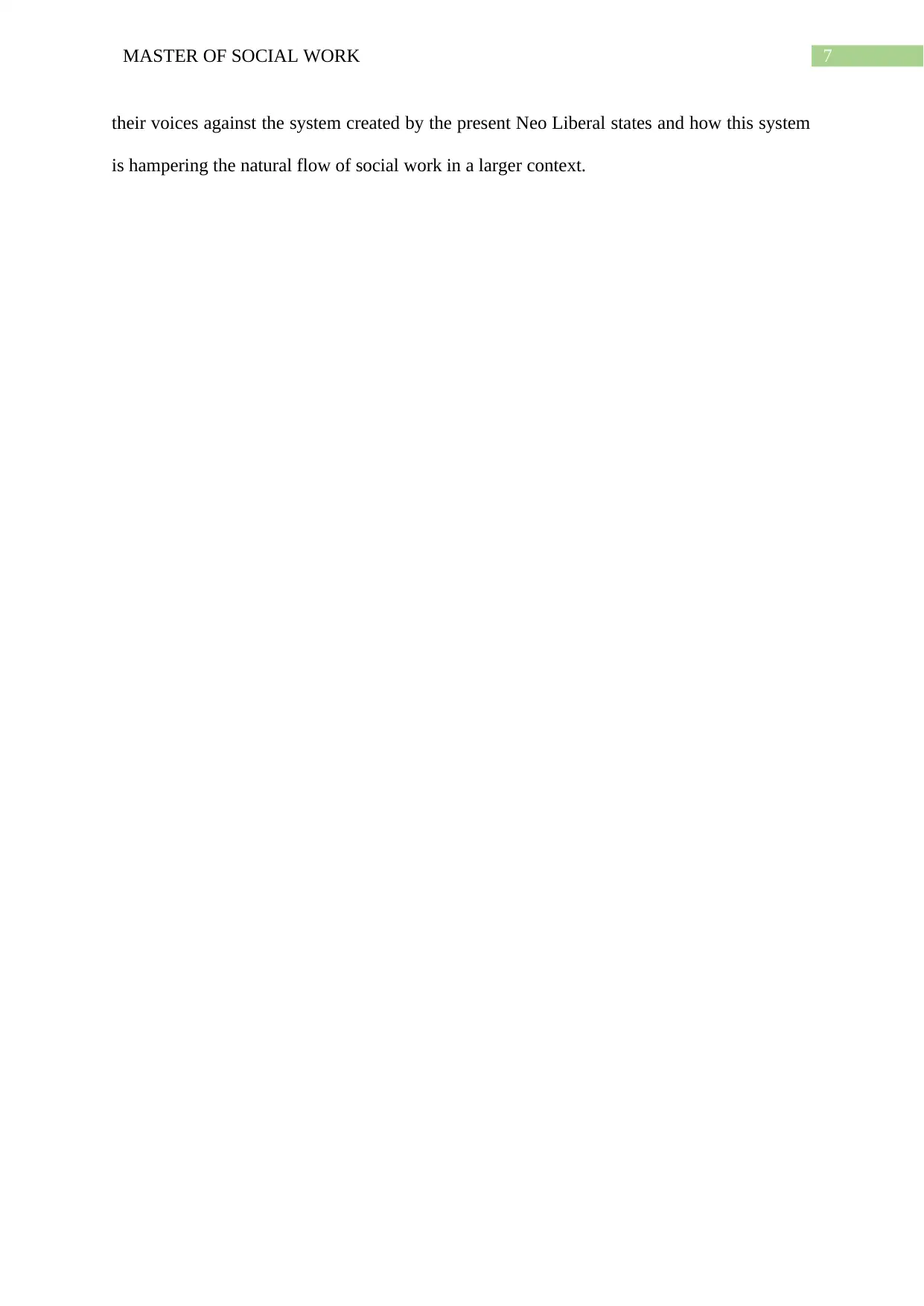
7MASTER OF SOCIAL WORK
their voices against the system created by the present Neo Liberal states and how this system
is hampering the natural flow of social work in a larger context.
their voices against the system created by the present Neo Liberal states and how this system
is hampering the natural flow of social work in a larger context.
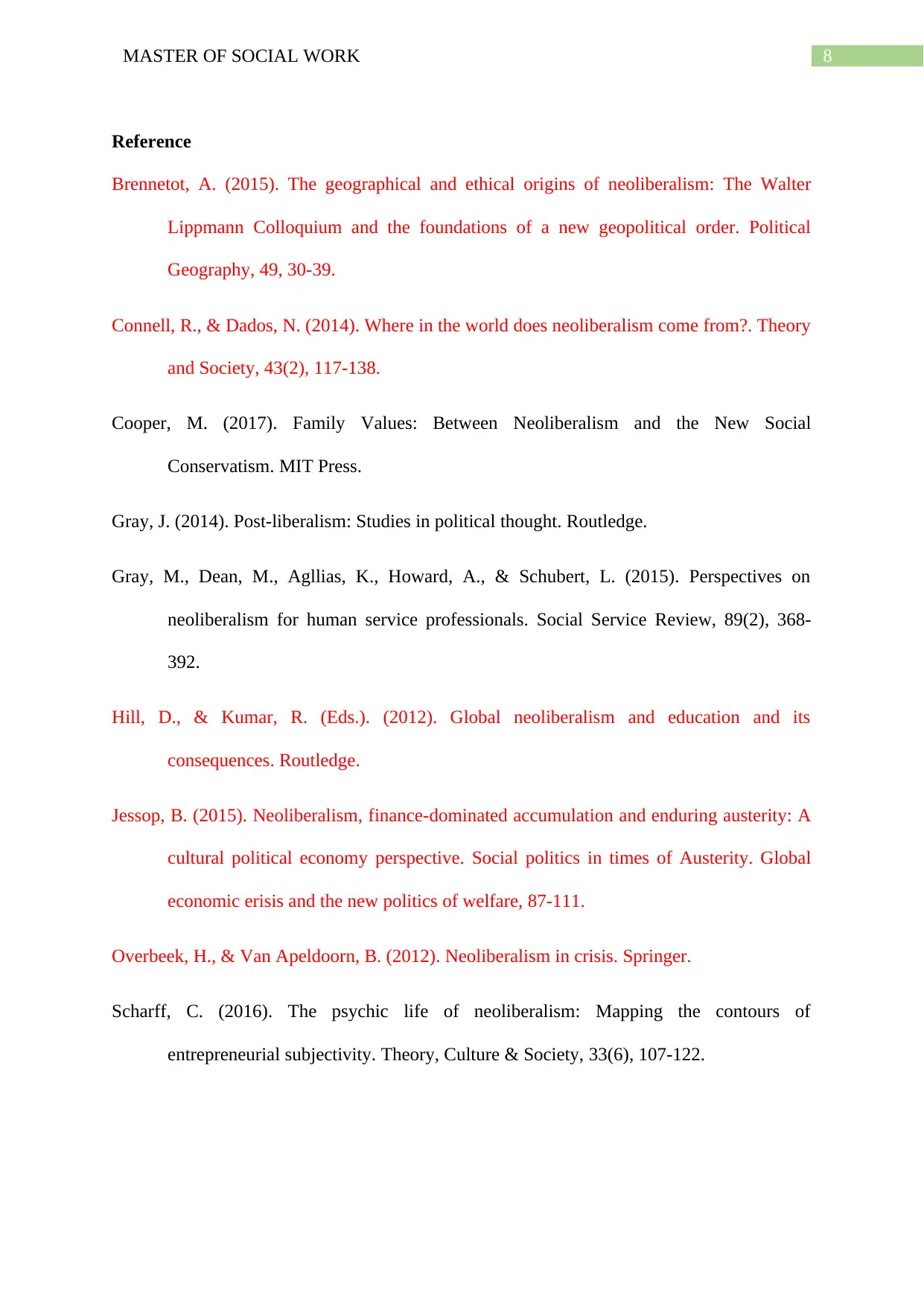
8MASTER OF SOCIAL WORK
Reference
Brennetot, A. (2015). The geographical and ethical origins of neoliberalism: The Walter
Lippmann Colloquium and the foundations of a new geopolitical order. Political
Geography, 49, 30-39.
Connell, R., & Dados, N. (2014). Where in the world does neoliberalism come from?. Theory
and Society, 43(2), 117-138.
Cooper, M. (2017). Family Values: Between Neoliberalism and the New Social
Conservatism. MIT Press.
Gray, J. (2014). Post-liberalism: Studies in political thought. Routledge.
Gray, M., Dean, M., Agllias, K., Howard, A., & Schubert, L. (2015). Perspectives on
neoliberalism for human service professionals. Social Service Review, 89(2), 368-
392.
Hill, D., & Kumar, R. (Eds.). (2012). Global neoliberalism and education and its
consequences. Routledge.
Jessop, B. (2015). Neoliberalism, finance-dominated accumulation and enduring austerity: A
cultural political economy perspective. Social politics in times of Austerity. Global
economic erisis and the new politics of welfare, 87-111.
Overbeek, H., & Van Apeldoorn, B. (2012). Neoliberalism in crisis. Springer.
Scharff, C. (2016). The psychic life of neoliberalism: Mapping the contours of
entrepreneurial subjectivity. Theory, Culture & Society, 33(6), 107-122.
Reference
Brennetot, A. (2015). The geographical and ethical origins of neoliberalism: The Walter
Lippmann Colloquium and the foundations of a new geopolitical order. Political
Geography, 49, 30-39.
Connell, R., & Dados, N. (2014). Where in the world does neoliberalism come from?. Theory
and Society, 43(2), 117-138.
Cooper, M. (2017). Family Values: Between Neoliberalism and the New Social
Conservatism. MIT Press.
Gray, J. (2014). Post-liberalism: Studies in political thought. Routledge.
Gray, M., Dean, M., Agllias, K., Howard, A., & Schubert, L. (2015). Perspectives on
neoliberalism for human service professionals. Social Service Review, 89(2), 368-
392.
Hill, D., & Kumar, R. (Eds.). (2012). Global neoliberalism and education and its
consequences. Routledge.
Jessop, B. (2015). Neoliberalism, finance-dominated accumulation and enduring austerity: A
cultural political economy perspective. Social politics in times of Austerity. Global
economic erisis and the new politics of welfare, 87-111.
Overbeek, H., & Van Apeldoorn, B. (2012). Neoliberalism in crisis. Springer.
Scharff, C. (2016). The psychic life of neoliberalism: Mapping the contours of
entrepreneurial subjectivity. Theory, Culture & Society, 33(6), 107-122.
⊘ This is a preview!⊘
Do you want full access?
Subscribe today to unlock all pages.

Trusted by 1+ million students worldwide
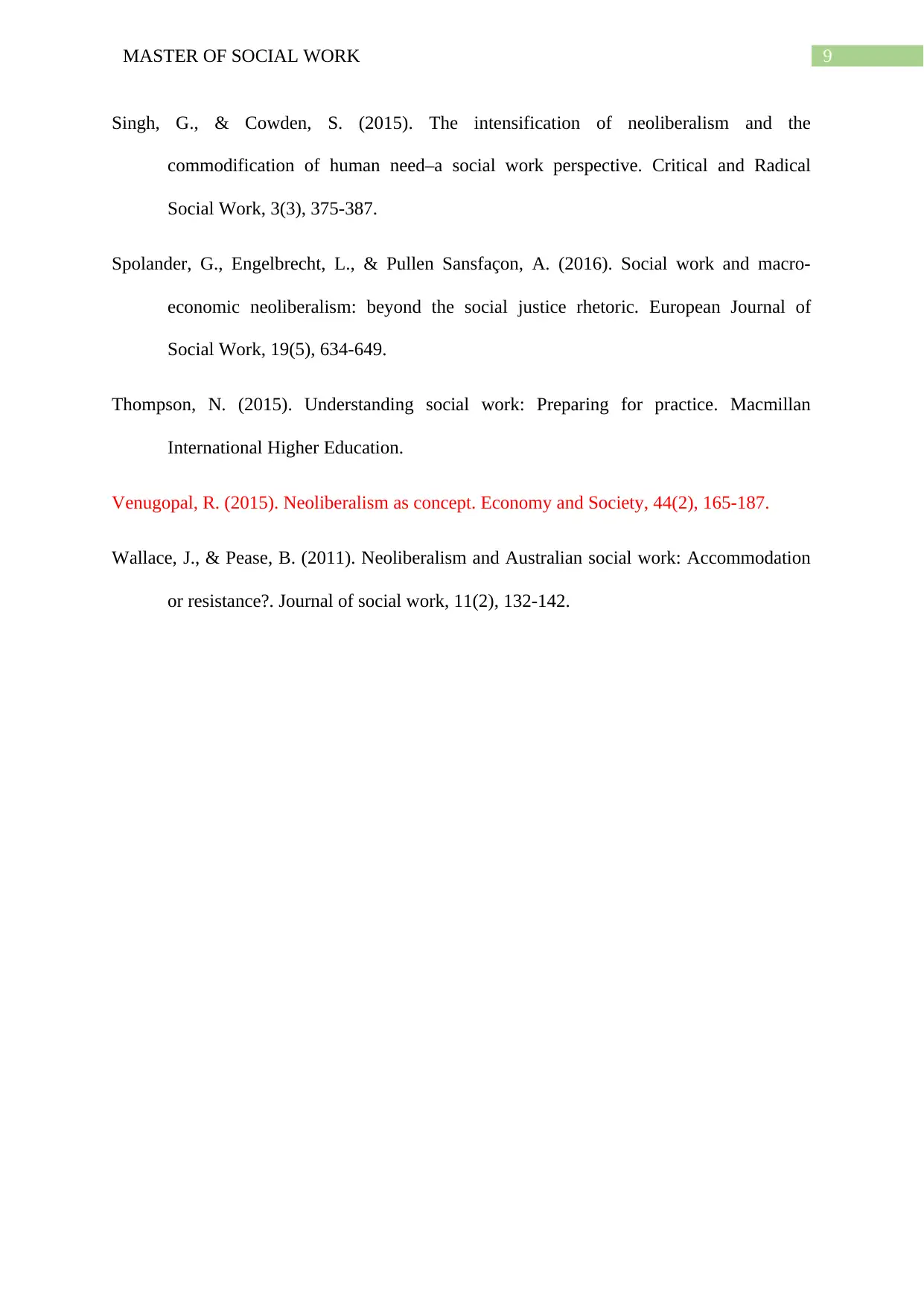
9MASTER OF SOCIAL WORK
Singh, G., & Cowden, S. (2015). The intensification of neoliberalism and the
commodification of human need–a social work perspective. Critical and Radical
Social Work, 3(3), 375-387.
Spolander, G., Engelbrecht, L., & Pullen Sansfaçon, A. (2016). Social work and macro-
economic neoliberalism: beyond the social justice rhetoric. European Journal of
Social Work, 19(5), 634-649.
Thompson, N. (2015). Understanding social work: Preparing for practice. Macmillan
International Higher Education.
Venugopal, R. (2015). Neoliberalism as concept. Economy and Society, 44(2), 165-187.
Wallace, J., & Pease, B. (2011). Neoliberalism and Australian social work: Accommodation
or resistance?. Journal of social work, 11(2), 132-142.
Singh, G., & Cowden, S. (2015). The intensification of neoliberalism and the
commodification of human need–a social work perspective. Critical and Radical
Social Work, 3(3), 375-387.
Spolander, G., Engelbrecht, L., & Pullen Sansfaçon, A. (2016). Social work and macro-
economic neoliberalism: beyond the social justice rhetoric. European Journal of
Social Work, 19(5), 634-649.
Thompson, N. (2015). Understanding social work: Preparing for practice. Macmillan
International Higher Education.
Venugopal, R. (2015). Neoliberalism as concept. Economy and Society, 44(2), 165-187.
Wallace, J., & Pease, B. (2011). Neoliberalism and Australian social work: Accommodation
or resistance?. Journal of social work, 11(2), 132-142.
1 out of 10
Related Documents
Your All-in-One AI-Powered Toolkit for Academic Success.
+13062052269
info@desklib.com
Available 24*7 on WhatsApp / Email
![[object Object]](/_next/static/media/star-bottom.7253800d.svg)
Unlock your academic potential
Copyright © 2020–2026 A2Z Services. All Rights Reserved. Developed and managed by ZUCOL.





